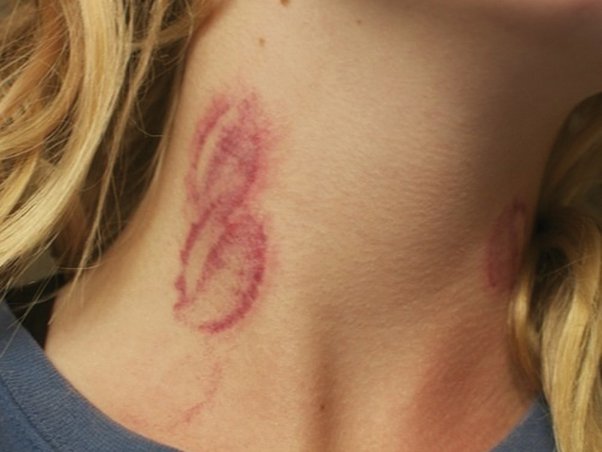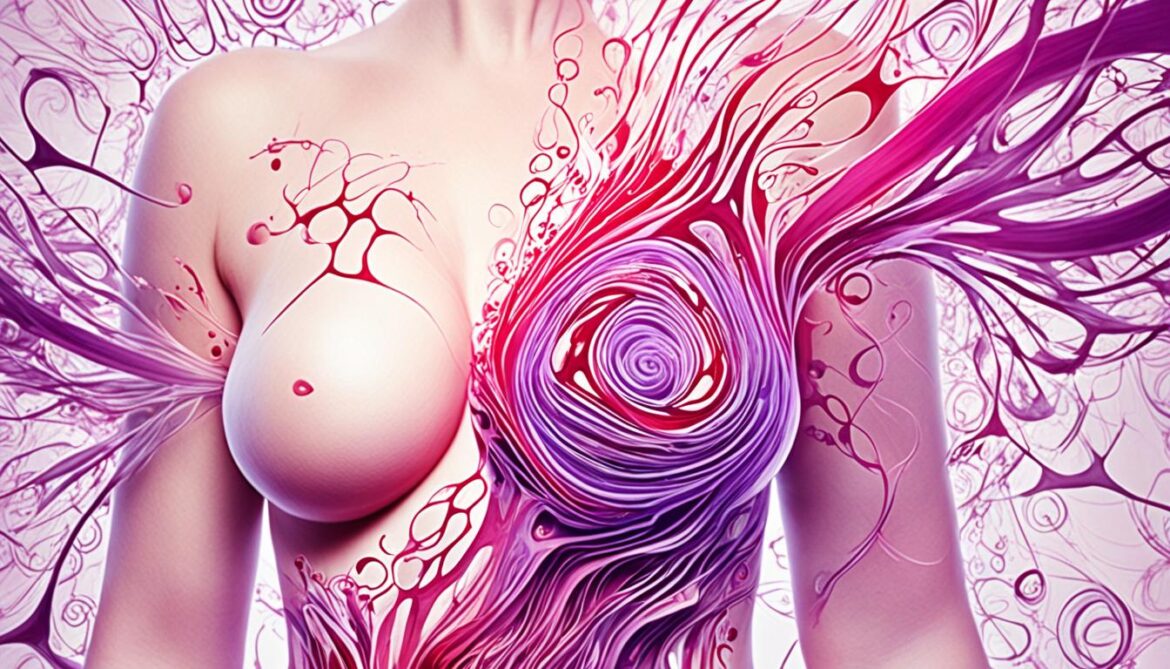Can Hickeys on Breasts Cause Cancer? Risks and Facts You Need to Know
Imagine being cuddled up with your partner, things getting a little heated, and they leave a trail of kisses down your neck. The next morning, you find a hickey – or a “love bite.” You might feel embarrassed or uncomfortable.
But, some thoughts spring up, “Is it bad to get hickeys on your breast?” “Can these hickeys on my breasts cause cancer?” “can a disease be transmitted through this?”
Don’t worry, the answer is no. Hickeys, even on sensitive areas like the breasts, are usually harmless and don’t cause cancer. But, it’s good to know a few things about these intimate bruises.

What is a Hickey?
Uncovering the Truth About Love Bites
A hickey, also known as a “love bite,” is a bruise caused by biting or sucking the skin hard. This action makes the small blood vessels under the skin break. This leads to a mark that looks dark and discolored. Doctors might call it ecchymosis, erythema, hematoma, purpura, or petechiae.
Hickeys often happen during intimate moments and can show up on the neck, shoulders, or chest. These areas have thinner skin, making them more likely to get hickeys. The pressure from biting or sucking is easily passed on to the blood vessels here.
Creating a hickey means the capillaries break, letting blood spots come out and form a mark. The mark’s size, color, and how long it lasts depend on how hard the suction was, how sensitive the skin is, and the person’s health.
- Hickeys can take up to two weeks to fully heal.
- Larger hickeys may take longer to disappear than smaller ones.
- Hickeys can turn different shades of green, yellow, and brown as they start to fade.
Hickeys are usually harmless and will go away on their own. But, they can be embarrassing or not suitable in some situations. Rarely, hickeys that don’t heal or are very big might show a health issue and need a doctor’s help.
“A hickey is a minor injury to blood vessels close to the skin and should not harm the skin significantly.”
Knowing about hickeys helps in keeping relationships healthy and dealing with any issues that come up. Being informed about these “love bites” lets people be more careful and thoughtful in their physical closeness.

Is it bad to get hickeys on your breast?
Is getting hickeys on your breasts a good idea? These love bites might seem harmless, but they can be risky. They can harm the delicate skin and tissue of your breasts.
The act of creating a hickey involves forceful suction and biting. This can lead to bruising, inflammation, and even damage to your breast’s sensitive parts. Plus, a visible hickey might make you feel self-conscious, especially when it shows through your clothes.
But there’s more to worry about. Hickeys can attract unwanted attention or judgment from others. This is the last thing you want when you’re trying to feel confident. Not only does it make you sore, it’s like billboard for what you’ve been up to
So, is it worth the risks? This is a choice you and your partner should discuss. Talk about your boundaries and what makes you comfortable. Remember, consent and safety are key in any physical intimacy.
The risks of breast hickeys, dangers of hickeys on breasts, and safety concerns with breast hickeys are important to think about. Your well-being shouldn’t be risked for a fleeting thrill. Think about the pros and cons and choose what’s best for you.
Potential Health Concerns
Hickeys are usually harmless but can sometimes lead to serious health issues. These “love bites” can cause more than just a bruise on the skin.
A rare but serious issue is the risk of blood clots from hickeys. In very rare cases, a hickey can cause a blood clot that might lead to a stroke. This condition, called carotid artery dissection, is very rare, with only a few reported cases.
People with blood clotting disorders or weak blood vessels are more at risk. But, the chances of a hickey causing a blood clot that leads to death are very low.
Even though hickeys are not a big health risk, knowing about possible issues is important. If a hickey doesn’t heal in two weeks or hurts, you should see a doctor. Also, if it comes with other bruises or signs of paralysis, get medical help right away.
Knowing about the rare but serious problems hickeys can cause helps people make better choices. It’s important to focus on health and safety in all intimate activities. Always talk and agree before doing anything that might be risky.
Can Hickeys Be Dangerous?
Hickeys are usually harmless, but you should see a doctor if:
- The hickey doesn’t fade after a few weeks.
- You notice unexplained bruises elsewhere.
- the hickey is very sore.
- There’s a lump over the bruise.
These symptoms might indicate a blood disease or clotting disorder. Although rare, serious injuries like paralysis and stroke have been linked to hickeys.
Healing and Concealing Hickeys
Tips for Faster Recovery and Discretion
Dealing with a pesky hickey can be annoying, but there are ways to make it heal faster and hide it. Hickeys usually take 1-2 weeks to heal and fade. You can try some methods to speed up the healing and hide the mark.
To make a hickey heal quicker, use a cold compress on it for the first few days. This reduces swelling and color changes. After three days, switch to a warm compress to improve blood flow and healing. Gently massaging the hickey can also help break up the blood under the skin, making it fade faster.
If you need to hide a hickey fast, there are a few things you can do. Use makeup, like color-correcting concealer, to cover up the color changes. Wearing a bandage or scarf over the area is another quick way to hide it. For a more subtle look, try wearing a turtleneck or high-collared shirt.
There’s no quick fix to make a hickey disappear, but these tips can help how to get rid of hickeys and covering up hickeys better. With patience and the right steps, you can quickest way to heal hickeys and move past the love bite.
“Embrace your hickeys – they’re a badge of honor, not a source of shame.”
- Apply a cold compress for the first 2 days to reduce swelling and discoloration.
- Switch to a warm compress starting on day 3 to increase blood flow and healing.
- Gently massage the hickey area to help break up the blood under the skin.
- Use color-correcting concealer or a bandage to discreetly cover up the hickey.
- Wear a turtleneck or high-collared shirt for more discrete coverage.
Hickeys are a normal part of being close with someone, and there’s no need to feel bad about them. Embrace your love bites with confidence and creativity!
Communication and Consent
When it comes to physical intimacy, like hickeys, talking and agreeing with your partner is key. It’s important to discuss what you both want and what you’re okay with. This keeps your relationship healthy and respectful.
If hickeys make you uncomfortable, especially on sensitive spots, speak up. Let your partner know you’re not okay with it. Remember, consent is ongoing. It means always checking in with each other to make sure you’re both good with what you’re doing.
- The word “hickey” entered the English lexicon in 1934, and these visible marks of affection can last anywhere from a few days to two weeks.
- Hickeys represent a way of marking territory and are often associated with lust, but they should primarily result from fun and pleasure, not ownership or exhibitionism.
- Giving or receiving a hickey on a sensitive area like the breasts requires extra consideration and consent to ensure the recipient’s comfort and avoid potential embarrassment or discomfort.
Talking is crucial when it comes to hickeys with a partner. By setting boundaries and making sure everyone agrees, you can enjoy intimacy in a way that respects everyone’s needs and desires.
“Consent and communication are crucial when giving or receiving hickeys to ensure comfort and boundaries are respected.”
As people get older, deciding to give or get hickeys becomes more thoughtful. It can add a playful power-play twist. But, consent and understanding each other’s limits are always important. By talking openly and respecting each other’s boundaries, you can have a fulfilling and satisfying intimate experience.
Conclusion
Hickeys on the breasts don’t directly cause cancer. But, they do come with some risks and concerns. These risks include bruising, inflammation, and discomfort. In rare cases, hickeys can lead to more serious health issues.
However, the health risks from hickeys are usually small. They don’t increase the chance of getting cancer. It’s important to talk openly with your partner about hickeys. Make sure you both agree and understand the risks involved.
Being careful and mindful is key. By knowing the facts and being cautious, you can enjoy hickeys safely. This way, you can have fun with your partner without worrying too much.
Even though hickeys are a common way to show affection, your health should always come first. Stay informed and focus on safety. This way, you can enjoy your moments with your partner without any unnecessary risks.


